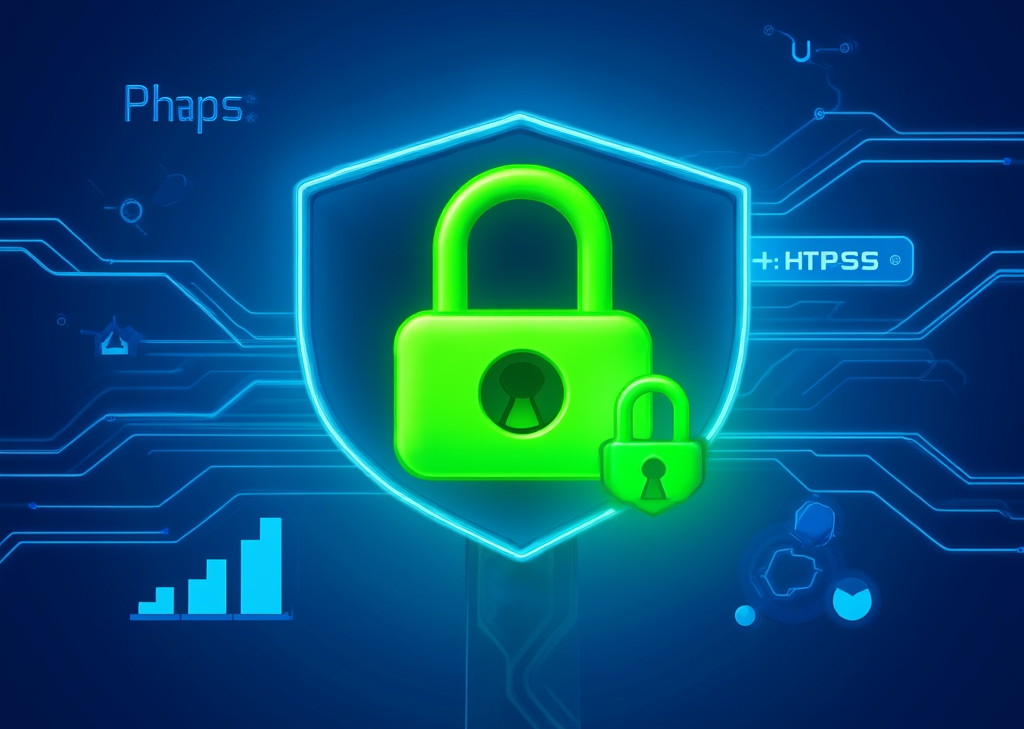How SSL Certificates Protect Your Website and Customers
Introduction
In today's bustling virtual marketplace, securing your digital space is no longer optional; it's essential. SSL certificates have emerged as the gatekeepers of trust, ensuring that the relationship between your website and your visitors is shielded from prying eyes. Think of SSL (Secure Socket Layer) certificates as a robust security blanket that wraps around your sensitive data — an unwavering guardian in a world rife with cyber threats.
Understanding how SSL works can transform the perception of your website from a digital entity into a trusted partner in your customers' online journey. It’s this trust that can turn occasional visitors into loyal patrons. Ready to dive deeper into the realm of SSL? Let’s explore how these certificates protect both your website and your customers, ensuring a secure and smooth experience on this unpredictable internet highway.
1. Data Encryption for Secure Connections
At the heart of SSL's functionality lies data encryption. Imagine sending a secret message enclosed in an intricately locked box — that’s what SSL does for the information exchanged between your users’ browsers and your server. With SSL, data like usernames, passwords, and credit card numbers is transformed into indecipherable code while in transit. This means that, without the correct key, even if a malicious actor intercepts the data, it remains useless to them. It's like sending a postcard without anyone being able to read its contents.
-
HTTP vs HTTPS: The presence of SSL helps establish HTTPS, which informs users that their connection is encrypted. This is visible in the URL bar of browsers — a subtle yet powerful cue that signals safety.
-
Consider an online store. A user completes a transaction with confidence, knowing that their sensitive information is encrypted and secured against interception.
2. Authentication and Website Identity Verification
With the emergence of phishing scams and counterfeit websites, trust is paramount. SSL certificates play a pivotal role as they serve to authenticate your website, confirming to users that it’s genuinely yours. When a customer sees a padlock icon in their browser’s address bar, they're reassured that they’re dealing with a legitimate entity.
This process hinges on a Certificate Authority (CA), a trusted third party that verifies the details of the website before issuing the certificate. This validation not only safeguards your users but also ensures your reputation remains untarnished.
-
From eCommerce platforms to personal blogs, every legitimate digital space can imprint this trust among its audience.
-
Imagine the impact of simply switching from HTTP to HTTPS; your click-through rates might soar as the padlock signifies security and legitimacy.
3. Data Integrity: Preventing Tampering
The journey of data isn't merely about its confinement; it's also about its integrity. SSL certificates guarantee that information transferred between the user and your server remains unchanged during transit. It acts like a digital seal that confirms the message’s contents haven’t been tampered with — a crucial defense against malicious actors attempting to alter information.
-
This is vital for secure transactions, where even a single wrong digit could mean financial loss or unauthorized access.
-
Imagine a customer inputting their credit card information, only to find out that the data was altered mid-transit. SSL prevents that nightmare scenario.
4. Boosting SEO and Search Ranking
Google has long prioritized website security as an essential factor influencing search rankings. If your website is secured with an SSL certificate, it’s more likely to rank higher in search results. This shift in focus towards HTTPS isn’t just a trend; it’s a reflection of a broader commitment to user safety.
-
Websites with SSL not only enjoy better rankings but also attract more traffic as these sites portray professionalism.
-
A staggering statistic shows that sites transitioning to HTTPS often experience increased engagement and lower bounce rates from visitors who feel reassured.
5. Compliance with Payment and Privacy Regulations
In a world where data breaches make headlines almost daily, compliance with payment and privacy regulations has never been more critical. For eCommerce and service-oriented businesses, SSL certificates are a non-negotiable requirement for compliance with PCI DSS (Payment Card Industry Data Security Standard) — ensuring customers' sensitive information is protected during payment processes.
-
Beyond payments, SSL assists in meeting various privacy legislation, securing personal data transmission that can otherwise be exploited.
-
Companies that fail to comply with these regulations may face severe penalties, adding another layer of importance to SSL implementation.
6. Improved Customer Trust and Conversion Rates
As a website owner, you strive for more than just visits; you seek conversions. Displaying security indicators, such as the padlock icon, fosters a sense of safety for your visitors. This simple visual cue can significantly impact their willingness to browse your offerings, share personal information, and ultimately complete transactions.
-
When users feel secure on your site, they’re more likely to convert from casual browsers to committed buyers.
-
Consider a scenario: You've got an eCommerce store, and an SSL certificate just upgraded your site’s security. Visitors, now feeling secure, begin to complete purchases at rates you've never seen before.
7. Practical Aspects: Installing SSL Certificates
The nitty-gritty of implementing SSL certificates can feel overwhelming, but it doesn’t have to be. Whether you are tech-savvy or just starting your digital journey, the installation process generally involves a few straightforward steps:
-
Obtaining the certificate: Purchase an SSL certificate from a trusted Certificate Authority.
-
Installation: Upload and install the certificate on your web server type, whether it’s Apache, Nginx, or another variant.
-
Configuration: Set your server to use the HTTPS protocol and establish redirections for non-secure traffic.
-
Verification: Ensure everything is set up properly to avoid any browser warnings about insecure connections that could deter users.
-
Hosting providers typically offer user-friendly tools or managed services, making this process simpler than it may seem.
SSL certificates are no longer just a technical requirement; they are a fundamental element in the relationship between your website and your users, transforming digital spaces into safe havens for communication and transactions. With every click, every form filled out, the significance of SSL reverberates through the digital corridors, ensuring that trust and security remain at the forefront of your online interactions.
Only through these protections can we slay the dragons lurking in the shadows of the internet. So as you navigate through the complexities of online security, remember: your commitment to SSL is not just about protection — it's about paving the way for a safe future in the digital world.
FINDDOMAIN.GE (Internet services LLC) is a very interesting and rapidly developing IT company. The main directions are: web development, domain and web hosting. It also offers clients sub-services and outsourcing related to the main services.
BEST OFFERS:
Do you want to create your own company website or create your own online business on the Internet?
– WEB HOSTING
– DOMAIN REGISTRATION
– WEB DEVELOPMENT
– SITE BUILDER



8. The Evolving Landscape of Cybersecurity
As we embrace a digitally-driven society, the importance of security continues to grow. SSL certificates represent a vital line of defense against an ever-evolving landscape of cyber threats. With cybercriminals becoming increasingly sophisticated, a simple website without SSL is akin to leaving your front door wide open in a crime-ridden neighborhood.
-
Cybersecurity is a shared responsibility, and every website owner plays a crucial role in safeguarding users, especially in sensitive environments such as online banking, eCommerce, and personal health information platforms.
-
Take the rise of ransomware as a key example. Cyber attackers can leverage unprotected data transactions to hold businesses hostage. SSL acts as a deterrent, fortifying it against such threats.
9. User Education: Raising Awareness
While implementing SSL certificates enhances protection, educating users about cyber safety is equally essential. Encouraging your visitors to be vigilant can create a ripple effect of enhanced security. From recognizing phishing schemes to understanding the significance of secure connections, empowerment through education leads to a more informed user base:
-
Simple tips: Help users identify secure sites by educating them on what to look for – such as the HTTPS prefix and padlock icon.
-
Community engagement: Consider creating blog posts or tutorials that enlighten your audience about SSL benefits and how they can protect their data online.
10. The Future of SSL Certificates
Looking ahead, we can anticipate ongoing innovations in SSL technology. As cyber threats continue to mutate, the encryption methods and validation processes will evolve to meet these challenges. For instance, the use of Quantum Key Distribution (QKD) is emerging on the horizon, promising enhanced security measures that can outsmart even the most advanced hacking techniques.
- As a website owner, staying informed about these trends and updates will help you adapt to the ever-changing cybersecurity landscape, ensuring your site remains a fortress of security.
Emerging Trends
-
Artificial Intelligence: AI will begin playing a larger role in detecting vulnerabilities and potential security breaches in real time.
-
Browser Initiatives: More browsers may unify standards to improve verification processes, making SSL even more accessible and straightforward for users.
Wrapping it Up
SSL certificates are more than just a technical necessity; they are a cornerstone of trust that can pave the way for thriving online interactions. By encrypting sensitive information, validating your website, ensuring data integrity, and improving search rankings, SSL fundamentally transforms your digital presence into a secure haven for all users.
It's a multifaceted shield that protects not only your customers but also your own reputation as a business that genuinely cares about online safety. In an age where digital trust is the currency of the realm, SSL certificates are indispensable tools that every website must utilize.
As we continue to explore and implement these security measures, let’s not forget the collaborative effort it takes to create a safer internet for everyone. Your commitment to adopting SSL is a meaningful step forward in that journey — for your business, your customers, and the online community as a whole.
Additional Resources
For a more in-depth understanding of SSL certificates and their importance in cybersecurity, check out these videos:
- What is SSL? A Beginner’s Guide
- How SSL Certificates Keep Your Data Secure
- The Importance of HTTPS for Your Website
Remember, in the vast sea of the internet, the safety of your digital footprint rests in your hands, and an SSL certificate is your armor. Secure your site, protect your users — and let trust pave the way for your online success.
**References:**
1. SSL Basics
2. What is SSL?
3. Let’s Encrypt
4. GlobalSign: What is SSL?
5. Cloudflare: What is an SSL Certificate?
6. The SSL Store
7. SSL Shopper: What is an SSL Certificate?
8. PCI Security Standards Council
BEST OFFERS:
Do you want to create your own company website or create your own online business on the Internet?
– WEB HOSTING
– DOMAIN REGISTRATION
– WEB DEVELOPMENT
– SITE BUILDER









Leave feedback about this